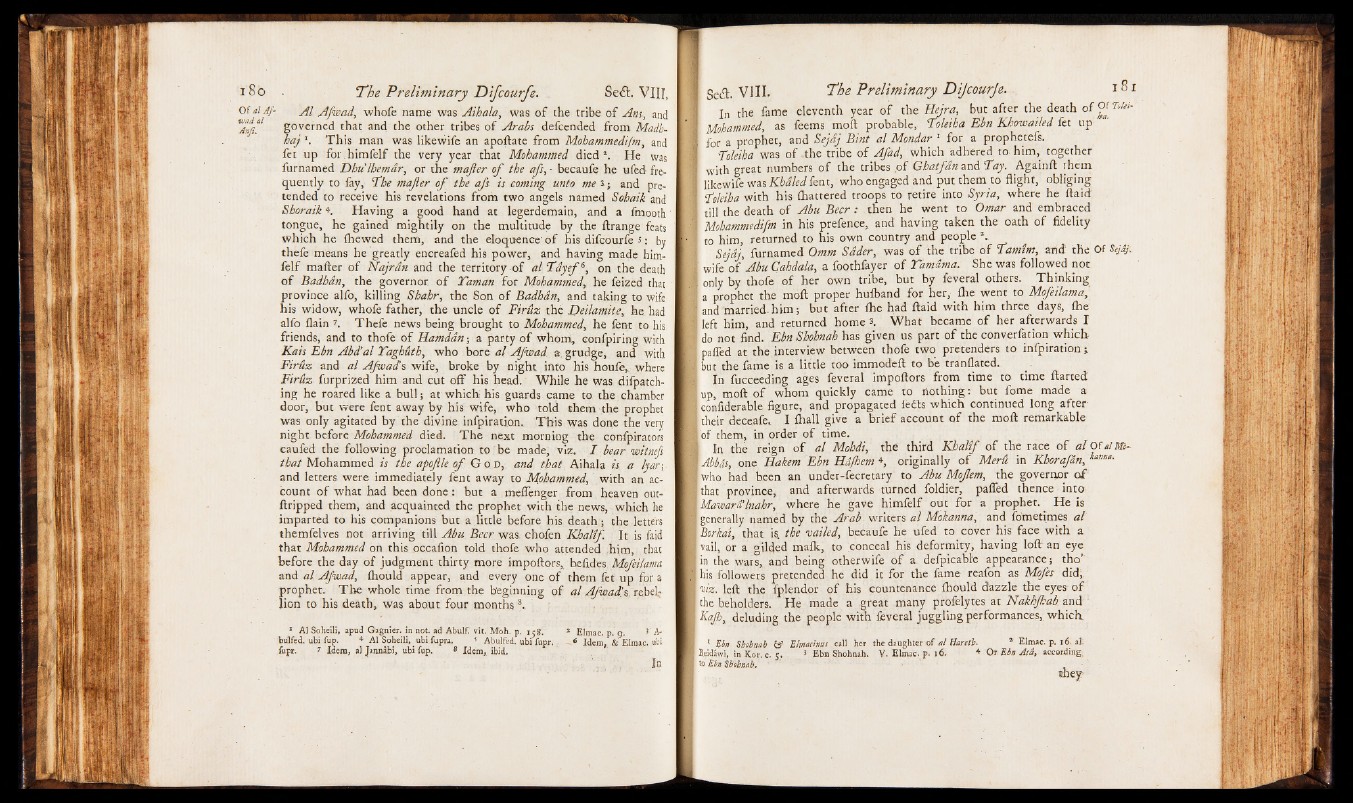
ï's m
H
O f al Af-
wad al
A l Afwad, whofe name was Aihala, was of the tribe of Am, and
governed that and the other tribes of Arabs defcended from Madb-
haj This man was likewife an apoftate from Mohammedifm, and
fet up for himfelf the very year that Mohammed died*. He was
furnamed Dhu’lhemar, or the majier of the afs, ■ becaufe he ufed frequently
to fay, ‘The majier o f the afs is coming unto me i ; and pretended
to receive his revelations from two angels named Sohaik and
Shoraik4. Having a good hand at legerdemain, and a fmooth
tongue, he gained mightily on the multitude by the ftrange feats
which he (hewed them, and the eloquence' of his difcourfe s ; by
thefe means he greatly encreafed his power, and having made himfelf
mafter of Najrdn and the territory of al Tayef6, on the death
o f Badhan, the governor o f Taman for Mohammed, he feized that
province alfo, killing Shahr, the Son of Badhan, and taking to wife
his widow, whofe father, the uncle of Firuz the Deilamite, he had
alfo flain 7. Thefe news being brought to Mohammed, he font to his
friends, and to thofe of Hamdan; a party of whom, confpiring with
Kais Ebn Abd'ai Taghuth, who bore al Afwad a grudge, and with
Firuz and al Afwads wife, broke by night into his houfe, where
Firuz furprized him and cut off his head. While he was difpatch-
ing he roared like a bull; at which his guards came to the chamber
door, but were fent away by his wife, who told them the prophet
was only agitated by the divine infpirati.on.. This was done the very
night before Mohammed died. The next morning the confpirators
caufed the following proclamation to be made, viz. I bear witnefs
that Mohammed is the apoftle o f G o d , and that Aihala is a lyar
and letters were immediately fent away to Mohammed, with an account
of what had been done: but a meflenger from heaven out-
ftripped them, and acquainted the prophet with the news, which he
imparted to his companions but a little before his death ; the letters
themfelves not arriving till Abu Beer was, chofen Khallf It is faid
that Mohammed on this occafion told thofe who attended him, that
before the day of judgment thirty more impoftors, befides Mofeilama
and al Afwad, fhould appear, and every one of them fet up for a
prophet. The whole time from the beginning of al AJhn.ad'. s, rebel;
lion to his death, was about four months8..
1 A] Soheili, apud Gagnier. in not. ad Abulf. vit. Moh. p. i$g. * Elmac. p. 9. 3 Abiilfed.
ubi Tup. 4 Al Soheili, ubi fupra. 5 Abulfed. ubi fupr, - 6 Idem, & Elmac. obi;
fupr. 7 Idem, al Tannabi, ubi fup. 8 Idem, ibid.
In
In the fame eleventh year of the Hejra, but after the death of ° r
Mohammed, as feems moft probable, Toleiha Ebn Khowailed fet up
for a prophet, and Sejdj Bint al Mondar 1 for a prophetefs.
Toleiha was of the tribe of Afad, which adhered to him, together
with great numbers of the tribes .of Ghatfan and Thy. Againft them
■ likewife was Khaled fent, who engaged and put them to flight, obliging
Toleiha with his {hattered troops to retire into Syria, where he ftaid'
till the death of Abu Beer: then he went to Omar and embraced
Mohammedifm in his prefence, and having taken the oath of fidelity
to him, returned to his own country and people *. _
Sejdj, furnamed Omm Sader, was of the tribe of Tamim, and the Of
wife of Abu Cahdala, a foothfayer of Tamdma. She was followed not
only by thofe of her own tribe, but by feveral others. Thinking
a prophet the moft proper hufoand for her, (he went to Mofeilama’
and married.him; but after (he had ftaid with him three days, (he
left him, and returned home 3. What became of her afterwards I
do not find. Ebn Shohnah has given us part o f the conversion which
paffed at the interview between thofe two pretenders to infpiration ;
but the fame is a little too immodeft to be tranflated.
In fucceeding ages feveral impoftors from time to time darted'
up, moft of whom quickly came to nothing: but fome made a
confiderable figure, and propagated feóts which continued long after
their deceafe. I (hall give a brief account of the moft remarkable
of them, in order o f time.
In thé reign of al Mohdi, the third K hallf o f the race o f a l of aim-
\Abbds, one Hakem Ebn FLdfhem *, originally of Merit in Khorafan, iama-
who had been an under-fecretary to Abu Moflem, the governor of
that province, and afterwards turned foldier, palled thence into
Maward’Inahr, where he gave himfelf out for a prophet. He is
generally named by the Arab writers al Mokanna, and (bmetimes al
Rorkai, that is. the vailed, becaufe he ufed to cover his face with a
vail, or a gilded ma(k, to conceal his deformity, having loft an eye
in the wars, and being otherwife of a defpicable appearance; tho
his followers pretended he did it for the fame reafon as Mofes did,
viz. left the fplendor of his countenance (hould dazzle the eyes of
the beholders. He made a great many profelytes at Nakkfab and
Kajfy deluding the people with feveral juggling performances, which.
1 Bbn Shohnah £*f Elmacinus call her the daughter of al Haretb- * Elmac. p. 16. al,
Beidawi, m Kor. c. s- 3 Ebn Shohnah. V. Elmac. p. 16. 4 Or E h Aid, according'
to. Eh'n Shohnah, ' f . y * •